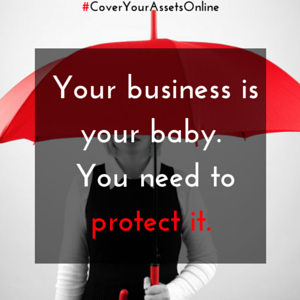WHAT DOES IT MEAN TO COVER YOUR ASSETS ONLINE?
What are “assets,” exactly?
And how does one actually “cover” them? We’re going to explore all the ways you can cover your assets online without having to hire a lawyer.
 When it comes your online business, your assets are all the things you rightfully and legally own.
When it comes your online business, your assets are all the things you rightfully and legally own.
If you had a bricks and mortar storefront your assets would include the store (building) itself and everything that you owned (furniture, inventory, etc.) on the inside. It would also include the name of your business (that’s the intellectual property).
Similarly, you’ve got assets to protect when you run a virtual business: your website (your storefront), your business name, domain name, website content, blog posts, products, services, images. In fancy schmancy legalese it’s called intellectual property (“IP”).
Cover Your Assets Online By Protecting Your Intellectual Property
Your IP is worth something.
The way you protect your IP is through trademark, copyright and contract agreements. I know this isn’t exactly the sexy part of running your own business, but it is the absolutely necessary part. Still, many new business owners think the legal stuff “can wait.” There’s a false sense of security that comes from having a “small business.” The opposite is actually true: online saboteurs know that the least protected business owners are the ones who think they don’t have to worry.
That’s why I created the Cover Your Assets Online “DIY Legal Toolkit.” It’s packed with information entrepreneurs absolutely need to know in order to protect themselves and their personal assets, as well as their IP, with instructions on how to take steps to cover those assets yourself. In that sense, it was created by a lawyer (me) so you don’t have to hire one.
The DIY Legal Toolkit comes in two sizes… MINI and MEGA.
The Three Legal Docs You Must Have On Your Website
Let’s start with the MINI TOOLKIT, which covers the three legal docs you must post on your website in order to cover your assets online. They are:
- A GDPR-compliant Privacy Policy.
- A Terms and Conditions Statement.
- A Disclaimer.
Learn more about how you can DIY those 3 important docs HERE.
Break Up With Your Sole Prop
And then there are your personal assets. You don’t want to unwittingly expose your home and investments to liability.
One of the first things you can do in that regard is to switch from being a sole proprietor to forming a limited liability company. You can even do that yourself.
When To Hire A Lawyer
Notice that I’m not saying you have to run out and hire a lawyer. On the contrary, there’s a lot you can do yourself (check out the DIY MEGA Legal Toolkit I created).
I’m also not saying you never have to hire a lawyer (for example, you should always hire a lawyer for trademark registration and partnership agreements). What I am saying is this: Find out what you can do yourself so you don’t have to pay a lawyer to do it. The amount of legal legwork you can do up front, before you hire a lawyer, will go a long way towards reducing the costs of hiring a lawyer.
Don’t (Accidentally) Steal Other People’s Stuff
Make sure you don’t step on anyone else’s IP toes, i.e., don’t assume that you can re-post content from another website as long as you give attribution.
Don’t assume those images are free for the taking off Google.
In other words, don’t infringe on other people’s copyright protected content. That could cost you. A lot.
Reduce Your Risk of Getting Sued
Getting sued is a nightmare. Avoid it at all costs by taking the proper legal steps to protect yourself and your business. This is why it’s so important to have a terms and conditions statement and a disclaimer posted on your website, along with a GDPR-compliant Privacy Policy. Learn how to DIY those three important docs HERE.
Don’t underestimate the power of “baseless claims” to grind your business to a halt.
When I say “cover your assets online” I’m imploring you to do everything legally possible to…
…reduce your risk of getting sued.
Or… getting slapped with a demand letter for thousands of dollars for using someone else’s content/images without authorization. I cannot tell you how often this happens, and it’s not even the biz owner’s fault; it’s because a contractor she hired (VA or web designer, for example) used photos to create content without permission! This is what I mean about the dangers of not knowing what you don’t know.
Take time to educate yourself about all the legal twists and turns that could impact your business. This is not something to mess around with. This isn’t the same as someone telling you how to make your website prettier. This is a lawyer telling you, straight up, what you need to do in order to cover your assets online. (Do you argue with your dentist when she tells you to brush your teeth so you don’t end up needing a root canal?)
You’re working hard to build your business.
Isn’t it worth protecting?
